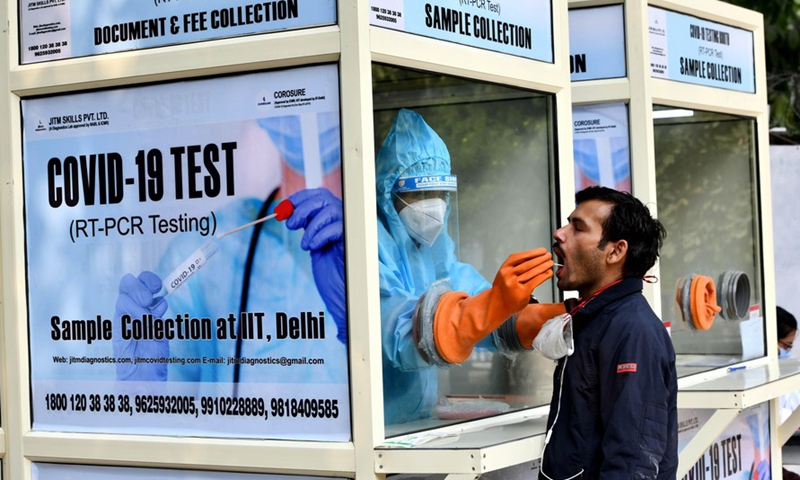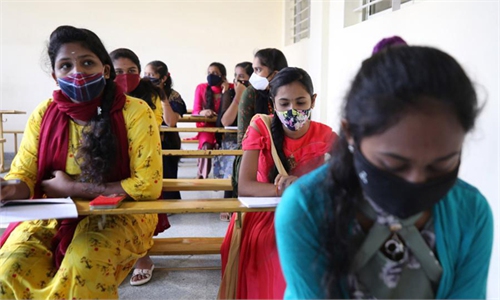
A health worker collects a swab from a man during a COVID-19 test in New Delhi, India, on Nov. 6, 2020.File photo:Xinhua
India, the world's second most populous country and one of the countries hit hardest by the coronavirus, has approved its first domestic COVID-19 vaccine for emergency use only one month after the candidate was delivered into Phase III clinical trials, triggering concerns over safety and efficacy.
With the approval of the Indian domestic vaccine and sentiment against China fueled by some Indian politicians, the possibility for India to purchase quality Chinese vaccines may decrease, which could be a loss for India struggling to get its epidemic under control, observers said.
The vaccine, Covaxin, is an inactivated candidate developed by Bharat Biotech International Limited. Its Phase III clinical trials started on November 16, according to Indian media.
India reported about 10.3 million infections as of Monday, following the US with 20.7 million infections.
The serious epidemic may have allowed enough infections for interim analysis, experts said.
Data from Phase I and Phase II trials have showcased a tremendous amount of immunogenicity and safety data, NDTV reported Sunday, citing Balram Bhargava, the Director General of the Indian Council of Medical Research.
"The indicators are that it has a very high efficacy," Bhargava told NDTV, but declined to provide specific details, noting that an efficacy report would be available in weeks.
Using the same technology, theoretically, India's inactivated vaccine should be no different from China's, Tao Lina, a Shanghai-based vaccine expert, told the Global Times on Monday.
As to safety and efficacy, Tao said that there would not be any problem as long as trials could prove that India's vaccine can induce equal-level antibodies, especially the neutralizing antibody, as China's inactivated vaccine dose.
China announced it would grant conditional market approval for its first homemade COVID-19 vaccine developed by Sinopharm, which showed 79.34 percent efficacy and a 99.52 percent antibody positive conversion rate, according to interim results of the Phase III clinical trials.
However, Tian Guangqiang, assistant research fellow at the National Institute of International Strategy at the Chinese Academy of Social Sciences, hesitated to express confidence in India's vaccine, noting that as a major manufacturer of generic drugs in the world, India's independent medical research and development capacity is not that competent.
Even though the vaccine proves good efficacy, India would meet practical difficulties when rolling out the mass vaccination due to underdeveloped medical facilities, especially in remote areas and slums, Tian noted.
"It will be very difficult to count the population and conduct vaccination in the slums due to high mobility," Tian said.
The approval was taken more out of necessity to revive the Indian people's confidence in their government amid the worsening epidemic, Tian said
India had announced a rollout of mass vaccination within a week, with 300 million people to be vaccinated by July 2021 for free, Indian media reported.
Besides Covaxin, India has also approved the Oxford/Astra Zeneca vaccine for the domestic market, which is being manufactured locally by the Serum Institute of India, the world's largest vaccine manufacturer. It says it is producing more than 50 million doses a month, BBC reported.
With the approval for two vaccines as well as sentiment against China hyped by some Indian politicians, India likely has planned to close its market to Chinese vaccines which have been applauded and used by many countries, including Pakistan, Brazil and Turkey, Chinese experts said.
Pakistan announced on Thursday that the country would purchase 1.2 million of Sinopharm's inactivated vaccine.
Reluctance to use qualified Chinese vaccine may bring about a loss to India considering the large demand for mass vaccinations that its own production capacity probably would not be able to meet, experts noted.


